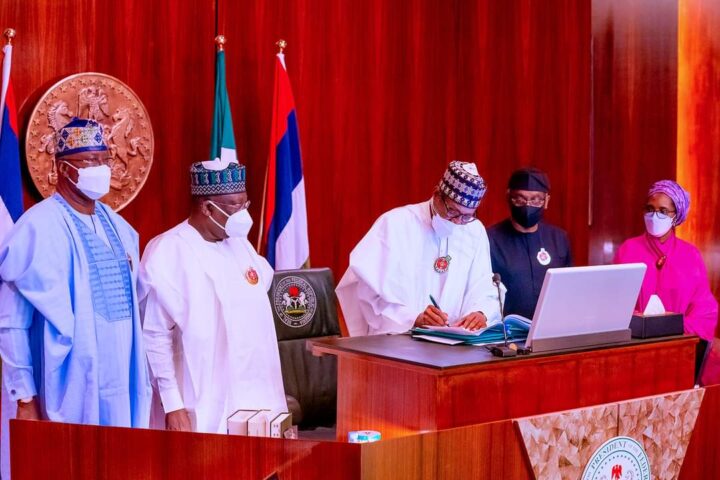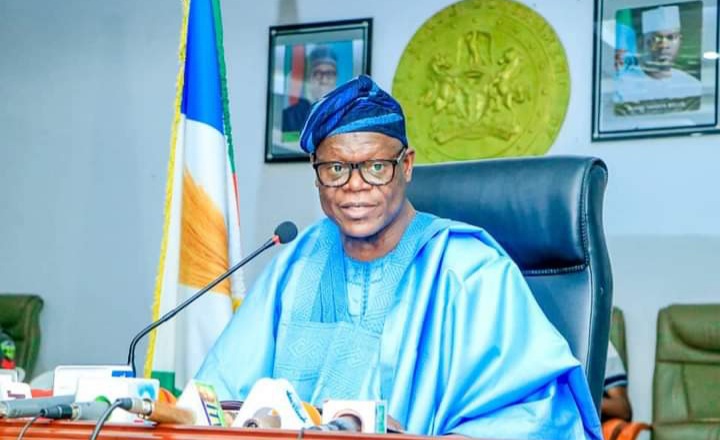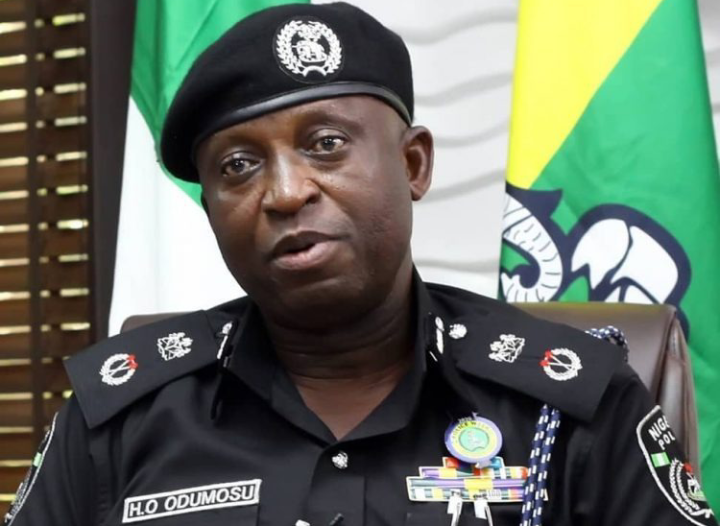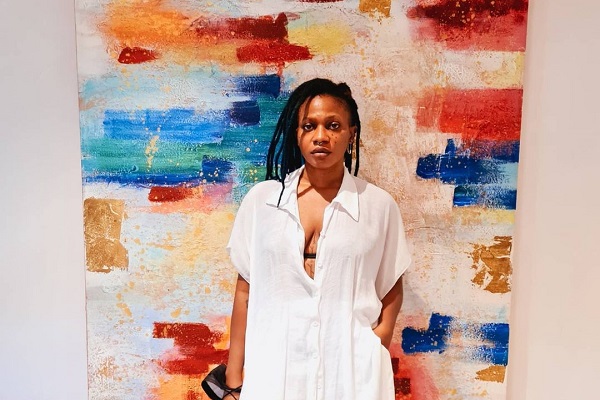On Friday, President Muhammadu Buhari signed a record N17.13 trillion 2022 appropriation bill into law — less than a week after the house of representatives and senate passed the bill.
The presidency had submitted a proposed fiscal budget of N16.391 trillion to the national assembly, but the lawmakers later raised it to N17.127 trillion — an increase of N735.8 billion.
The president frowned at the development.
In his remarks after signing the budget, Buhari said the lawmakers reduced the amount allocated to some projects but added over 6,500 projects of their own to the 2022 budget.
Advertisement
He expressed his reservations while describing some of the changes as “worrisome”.
However, history and data show that it is not uncommon for the national assembly to raise proposed budget spendings. In fact, the lawmakers have increased all but one of the seven budgets presented to them since Buhari assumed power in 2015.
Below is a breakdown of various budget proposals, and the “alterations” therein.
Advertisement
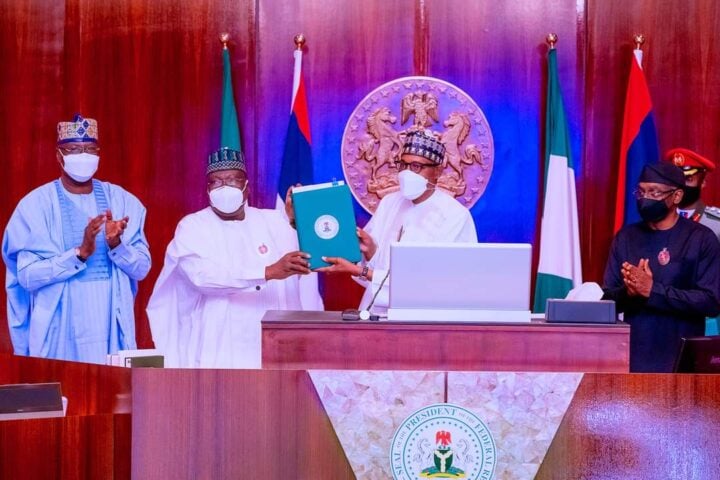
2016 BUDGET REDUCED BY N20 BILLION
Though Buhari assumed power in 2015, ex-President Goodluck Jonathan had signed the 2015 budget into law before leaving office in May.
Subsequently, in December 2015, Buhari assented to the 2015 appropriation amendment act passed by the national assembly, extending the 2015 financial year till March 31, 2016, and presented a proposed budget of N6.08 trillion for the 2016 fiscal year to the national assembly.
The national assembly passed the budget on March 23, 2016, reducing it to N6.06 trillion — but the president withheld his assent and returned the document on grounds that there were “grey areas” that needed corrections.
Advertisement
Buhari later signed on May 6, 2016, after the lawmakers had worked on the grey areas.
This was the first and only time the national assembly reduced a budget proposal presented by Buhari.
2017 BUDGET INCREASED BY N143 BILLION
Buhari presented a N7.298 trillion budget estimate for 2017 to the national assembly on December 14, 2016.
Advertisement
By the time the senate passed the appropriation bill on May 11, 2017, it had jumped to N7.44 trillion — an increase of N143 billion.
A month later, Vice-President Yemi Osinbajo, who was then acting president while Buhari was away on medical vacation in London, signed the appropriation act, christened ‘Budget of Economic Recovery and Growth’, into law.
Advertisement
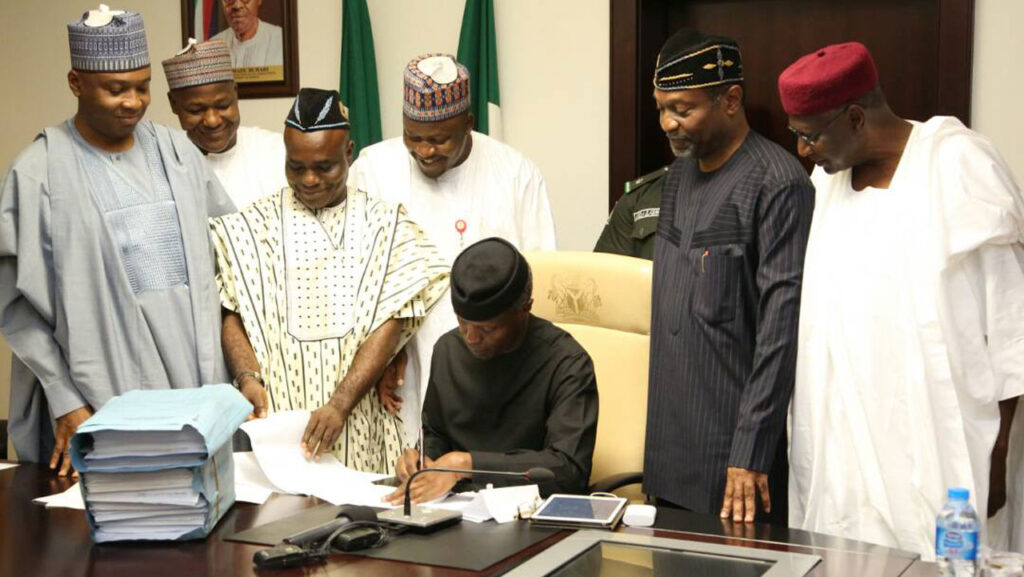
2018 BUDGET UP BY N500 BILLION
The presidency submitted the 2018 budget proposal of N8.612 trillion to the national assembly in November 2017.
Advertisement
Six months later, the national assembly passed the budget and raised it to N9.12 trillion — an increment of N500 billion.
In June 2018, Buhari assented to the appropriation bill. While signing the budget, Buhari accused the lawmakers of reducing allocations for important projects and injecting 6,043 projects.
Advertisement
2019 BUDGET INCREASED BY N86 BILLION
On December 19, 2018, Buhari presented a proposed budget of N8.83 trillion for 2019 to a joint session of the national assembly.
The lawmakers passed the budget in April 2019, but not before increasing it by N86 billion to N8.916 trillion.
A month later, the president signed the bill into law.
2020 BUDGET INCREASED BY N260 BILLION
Buhari proposed a 2020 budget of N10.33 trillion, but the national assembly increased it to N10.59 trillion — adding N260 billion.
The lawmakers also added N3 billion to the national assembly budget, increasing it from N125 billion to N128 billion.
Again, Buhari signed the budget as presented to him by the legislative chambers.
Meanwhile, the 2020 budget approval period was the fastest since Nigeria returned to democracy in 1999. The budget signing also placed Nigeria on the January-December budget cycle.
2021 BUDGET INCREASED BY N505 BILLION
For 2021, the president submitted a proposed budget of N13.08 trillion on October 8 2020, but the lawmakers increased it by N505 billion to N13.58 trillion.
In the proposed budget, a total of N128 billion was earmarked for the national assembly, but the lawmakers increased their budget to N134 billion.
On December 31, 2020, Buhari signed the 2021 appropriation bill of N13.588 trillion into law.
IS IT A BUHARI THING?
No, it is not. Padding the nation’s budget by the national assembly isn’t a new development or peculiar to the Buhari administration.
In December 2013, Jonathan, through Ngozi Okonjo-Iweala, then minister of finance, presented a budget of N4.642 trillion for the 2014 fiscal year to the national assembly. The national assembly raised the figure to N4.695 trillion — adding N53 billion.
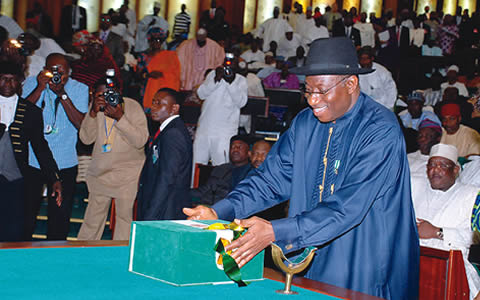
Jonathan signed the bill into law in May 2014, after the presidency complained of distortions to the budget.
In 2000, former President Olusegun Obasanjo refused to sign the budget passed by the national assembly, claiming it had been padded with about N2 billion. Obasanjo had submitted a proposal of N667.51 billion to be spent in the 2000 fiscal year.
The national assembly was allocated N22.7 billion, but the lawmakers added an extra N2 billion to their budget, raising it to N24 billion.
After weeks of a face-off between the executive and legislature, Obasanjo agreed to sign the budget on the condition that he would bring a supplementary bill to address the contentious issues.
Also, late ex-President Umaru Yar’Adua was faced with issues of budget padding by the national assembly.
For the 2008 budget, Yar’Adua had proposed N2.45 trillion. However, the national assembly raised the allocation for some items, a move the president was unsatisfied with, which led to him withholding assent to the bill.
A budget of N2.74 trillion — down from the national assembly’s initial N2.89 trillion — was eventually approved after weeks of disputes between the executive and the legislature.
Add a comment

